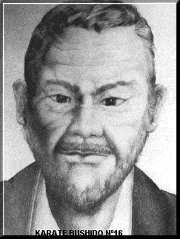Yasutsune Azato, often known as “Ankō” Azato, is one of the most respected historical figures in Okinawan karate. Although much less well known than his pupil, Gichin Funakoshi, Azato played a decisive role in shaping the martial art we know today.
Azato was born in 1827 in Okinawa, in what is now Japan. Born into a samurai family, he was raised in the martial arts tradition. His early training included the study of the traditional Japanese sword art, kenjutsu, as well as the Okinawan martial art, te.
With his exceptional talent and dedication to study, Azato quickly became a recognized master of kenjutsu and te. He was respected not only for his martial skills, but also for his impeccable character and erudition.
Azato was a close friend of Yasutsune Itosu, another great Okinawan karate master. Both men had a considerable influence on the development of modern karate. Together, they trained some of the most influential figures in karate history, including Gichin Funakoshi.
Azato met Funakoshi when the latter was still a young boy. Impressed by young Funakoshi’s intelligence and determination, Azato decided to take him on as a pupil. For many years, Funakoshi trained in the art of karate under Azato’s tutelage, often in secret due to the ban on martial arts at the time.
As a master, Azato was strict and rigorous. He insisted on discipline, technical precision and constant study. However, he was also a patient and caring teacher who placed great importance on his students’ personal growth. He taught his students not only the techniques of karate, but also its philosophy and principles.
Azato died in 1906, leaving behind him a lasting legacy in the history of karate. His influence is particularly visible in Funakoshi’s Shotokan karate, which combines Azato and Itosu techniques.
In short, Yasutsune Azato was a karate master of great integrity and talent. He played a crucial role in shaping modern karate, influencing not only the art’s technical development, but also its philosophy and principles. His dedication to teaching and his legacy continue to inspire karate practitioners around the world.


